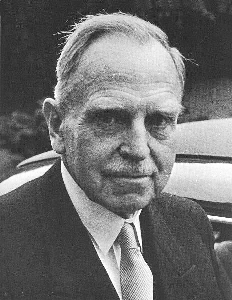Hahn, Otto (1879–1968)

Otto Hahn was a German chemist awarded the 1944 Nobel Prize in Chemistry for his work on nuclear fission. With Lise Meitner he discovered the element protactinium. Later they bombarded uranium with neutrons, treating the uranium with ordinary barium. Meitner showed that the residue was radioactive barium formed from the splitting (fission) of the uranium nucleus. The element hahnium is name after him.
During the First World War, Hahn was conscripted into the German Army, where he was placed in a special unit for chemical warfare. Hahn's unit developed, tested, and produced poison gas for military purposes, and was sent to both the western and eastern front lines.
During the Second World War, Hahn's discovery of nuclear fission led many to suspect that he was involved German efforts to develop an atomic bomb. In fact, however, he never worked on Germany's atomic program but instead spent most of his time studying various radioactive isotopes. Nevertheless, Hahn, along with other leading German scientists, including Max von Laue, Werner Heisenberg, and Carl Friedrich von Weizsäcker, were taken into custody by members of the Alsos Mission and interned at Farm Hall, Godmanchester, England from July 1945 until January 1946.
Hahnium
Hahnium (Ha) is a synthetic, radioactive, transactinide element. It has atomic number 105; six isotopes have been synthesized. It was first reported by a Soviet team at the Joint Institute for Nuclear Research at Dubna. They claimed the isotopes of mass numbers 260 and 261, as a result of bombarding americium with neon ions. In 1970 a team at the University of California claimed the isotope 260 (half-life 1.6 sec) obtained by bombarding californium with nitrogen nuclei. The element is named after Otto Hahn.


